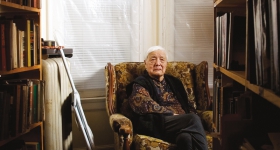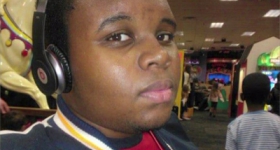photo by Russell Brammer
Ever feel an unyielding stare from airport security as
you pass through the scanner? You know you’re not a threat to national security, yet you feel
anxious, because of the suspicion that stare implies. Now imagine experiencing that same
stare wearing a turban and beard.
Sikh Americans especially have been profiled at airport security since the wake of 9/11, along with other passengers who are stereotyped as “dangerous” and a threat to national security. In response to airport profiling, this past
spring the national civil rights organization Sikh Coalition
created Fly Rights, a mobile phone app that gives passengers the
ability to report unfair screening practices
right after the incident occurs.
This revolutionary smartphone app combines mobile
technology with civil rights protections through a user-friendly interface that
has been widely downloaded by Americans.
The application lets passengers have a direct conversation with the
government about airport security, and how ineffective current policies are
when it comes to who is being profiled and who is not. In a report with NBC, Sikh Coalition program director Amardeep Singh stated that his organization and others like it receive hundreds of
reports a year about racial profiling from across the country. But
in its latest report to Congress, the TSA only reported 11
confirmed cases. "We are hoping this app will bridge the gap," Singh said.
For example, Singh questions how evenly the TSA currently applies the
policy pertaining to non-form fitting clothing.
The policy requires passengers who wear non-form fitting clothing to adhere
to secondary searches. Singh wants to
verify how consistent the policy is with passengers who wear turbans, versus passengers
who are wearing bunchy clothing on other parts of the body, “I’m having a hard
time believing that passengers with clothes that are non-form fitting on other
parts of the body are checked with the same scrutiny that the turban is
scrutinized.” He’d like to see the TSA’s numbers on these types of checks reported externally, to establish whether
all screenings are truly equal.
Singh states, “When
Sikhs are pulled aside for extra scrutiny in the most security sensitive area
in the United States (airport security), that act by the federal government reinforces
stereotypes that people already have of Sikhs. If the object that is most feared is the dastaar (turban), and the thing
the government is checking in particular are dastaars, we basically have an echo chamber between society and government
repeating messages of fear back and forth to one other on a particular object that
is so important to us.”
In working with Sikh Americans who have been profiled at
airports for the past 11 years, Singh has determined that once the fundamental
TSA policies change, there will be procedures and processes that can be more
evenly applied. The combination of policy changes, advanced technology, and
diversity sensitivity training can help create a fair baseline for screening
all passengers.
Today, Fly Rights is bridging the reporting gap with 14,600 downloads
and 60 profiling complaints registered in less than two months. One
third of
these complaints have been filed by Sikh Americans, with the next
highest from
the Muslim American community, and disability and women’s groups with a
fair number of complaints as well. The Sikh Coalition staff are
currently preparing to sit
down in their New York office with TSA officials to design the sketches
for Fly
Rights, Version 2.
The Coalition is also
pleased to see a diversity of passengers utilizing Fly Rights. In addition to Fly Rights Version 2, the
organization is brainstorming what mobile applications might look like for
reporting employment discrimination, unfair border patrol practices, and school
bullying.










Comments